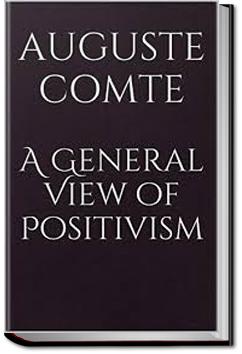UNLIMITED Audiobooks and eBooks
Over 40,000 books & works on all major devices
Get ALL YOU CAN for FREE for 30 days!
A General View of Positivism
Auguste Comte
Book Overview:
He made a very great impact on the sciences and claims to have “discovered the principal laws of Sociology." Comte says Reason has become habituated to revolt but that doesn’t mean it will always retain its revolutionary character. He discusses Science, the trade-unions, Proletariat workers, Communists, Capitalists, Republicans, the role of woman in society, the elevation of Social Feeling over Self-love, and the Catholic Church in this book. His goal is to replace theology with philosophy and develop the Religion of Humanity where Imagination is subordinate to Reason as Reason is to Feeling. Positivism can be summed up in this statements from his conclusion: “Love, then, is our principle; Order our basis; and Progress our end.”
He made a very great impact on the sciences and claims to have “discovered the principal laws of Sociology." Comte says Reason has become habituated to revolt but that doesn’t mean it will always retain its revolutionary character. He discusses Science, the trade-unions, Proletariat workers, Communists, Capitalists, Republicans, the role of woman in society, the elevation of Social Feeling over Self-love, and the Catholic Church in this book. His goal is to replace theology with philosophy and develop the Religion of Humanity where Imagination is subordinate to Reason as Reason is to Feeling. Positivism can be summed up in this statements from his conclusion: “Love, then, is our principle; Order our basis; and Progress our end.”
How does All You Can Books work?
All You Can Books gives you UNLIMITED access to over 40,000 Audiobooks, eBooks, and Foreign Language courses. Download as many audiobooks, ebooks, language audio courses, and language e-workbooks as you want during the FREE trial and it's all yours to keep even if you cancel during the FREE trial. The service works on any major device including computers, smartphones, music players, e-readers, and tablets. You can try the service for FREE for 30 days then it's just $19.99 per month after that. So for the price everyone else charges for just 1 book, we offer you UNLIMITED audio books, e-books and language courses to download and enjoy as you please. No restrictions.
Try now for FREE!

"Love your service - thanks so much for what you do!"
- Customer Cathryn Mazer
"I did not realize that you would have so many audio books I would enjoy"
- Customer Sharon Morrison
"For all my fellow Audio Book & E-Book regulars:
This is about as close to nirvana as I have found!"
- Twitter post from @bobbyekat



Community Reviews
Esse foi um livro interessante ter lido logo após a "Pedagogia do oprimido", por Paulo Freire pois se constrastam de forma que Comte é academicista, mas convergem de maneira de ambos anseiam em substituir uma educação dogmático e retrógrada.
A brilliant reflection of the 19th century's Zeitgeist.
Who would've thought, a book about epistemology made into political rhetoric. It's not even good political rhetoric, either. Not very good.
"The general problem of education consists enabling an individual of usually but average ability to reach in a few years the same stage of development that has been attained during a long series of ages by the efforts of a large number of superior thinkers, who have throughout their lives concentrat
This little book comprises the first two chapters of his Course on Positive Philosophy. He lived from 1798 to 1857.
Comte believes that human inquiry goes through three stages.: A theological stage, a metaphysical stage and finally a positive stage. The theological stage consists in imaginative attem
Auguste Comte is niet de minste: hij is een der grondleggers van de sociologie (hij heeft dat woord zelf uitgevonden, evenals het begrip altruïsme) en grondlegger van het positivisme. In dit boekje vat Comte zijn leer samen voor de geïnteresseerde beginner. Helaas is Comte een verre van heldere schr
This is a neat introduction to "positivism," which anyone trying to understand modern intellectual history will need to confront. This little pamphlet was originally part of a much longer series of lectures written and delivered by Comte, but it stands on its own as a basic introduction to his premi